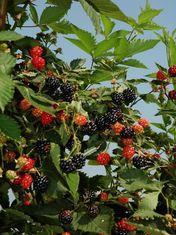
Four new US bred thornless blackberry varieties will be available to English growers next spring following the appointment of Hargreaves Plants as the European agent for the University of Arkansas, regarded as one of the leading international breeders. Since the programme began in 1964 it has made 2,100 selections out of 400,000 plants.
Named after American Indian tribes the newcomers to the UK - although the first of the family appeared in 1989 - are called Arapaho, Apache, Navaho and Ouachita.
The last of these is one of the most recent, selected in 2003, was described by breeder Professor John Clark as ‘the most exciting that we have developed because it is so highly adaptive.’ Another showing promise to be launched this year is Natchez.
Hargreaves is micropropagating the canes in tissue culture rather than the traditional vegetative method of growing from leaf bud cuttings and roots. Initial results have indicated that the former method offers a far greater potential to provide healthy plants and earlier yields, according to Jane Fairlie, responsible for R&D.
The decision by the university to expand into the UK was taken because this total market, now valued at retail at £14.3 million, has experienced demand benefiting from blackberries being categorised as a healthy super fruit in 2004, and supported by an international improvement with both size and sweeter taste.
This is particularly evident with Tupi, which has taken over from Brazos in Mexico, the major winter exporter to many countries. It has built up a 6,000 acre crop over a short time, and in so doing competed with the previous supplier, Chile.
English growers are also responding with an increase in production from 200 tonnes five years ago to an estimated 800 tonnes this year, being marketed between May and September. Sales had grown by 370 percent since 2004, and production by 200 percent, although still only one in five consumers made a purchase.
In retailing terms Tesco has 24 percent of the market, Sainsbury’s 23 percent, Asda - which was a late comer simply because there was not sufficient fruit for its needs - 12 percent , and Morrisons, Marks and Spencer and Waitrose around 10 percent. Against overall fresh produce sales most are over trading, agreed Adrian Wallbridge, technical director of the SummerFruit Company in presenting a market overview based on TNS data.
“There is a great opportunity ahead," reiterated Clark, with perhaps the strongest indication being that at the presentation held in Kent last week it attracted growers from Spain, Belgium, Poland, and Bulgaria.
"The challenge is to grow supersweet varieties, focus on eating quality and extending the English season,"added Jamie Petchell, Hargreaves product manager.
And looking to the future professor Clark has already identified primocanes which have, like raspberries, the potential to annually double crops shown to have the attributes in Arkansas, although it flourished when sent further north to Oregon which also has a reputation for crop development.
Having seen the impact of a milder climate, he believes it could have a major impact on blackberry production in the years to come. But breeding is both a specialist and laborious business and this takes time.



